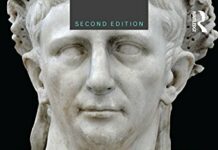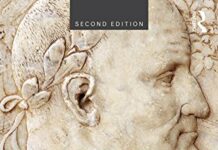
Ebook Info
- Published: 2003
- Number of pages: 303 pages
- Format: PDF
- File Size: 1.95 MB
- Authors: Barbara Levick
Description
Tiberius has always been one of the most enigmatic of the Roman emperors. At the same time, his career is uniquely important for the understanding of the Empire’s development on the foundations laid by Augustus.Barbara Levick offers a comprehensive and engaging portrait of the life and times of Tiberius, including an exploration of his ancestry and his education, an analysis of his provincial and foreign policy and an examination of his debauched final years and his posthumous reputation.This new edition of Tiberius the Politician contains a new preface and a revised bibliography.
User’s Reviews
Reviews from Amazon users which were colected at the time this book was published on the website:
⭐As they are intrinsically linked, Augustus plays a prominent role throughout Tiberius’ life and Levick’s work. (As does a cavalcade of characters akin to a Hellenistic soap opera, requiring of anyone attempting to read this book a preexisting knowledge of Roman history. Not only that, Levick uses words that I’m not only unfamiliar with but that I have never even seen – case in point: “probouleutic.”)Tiberius’ grooming by Augustus was to ambitious but ambiguous ends, as neither he nor any of Augustus’ other adopted sons knew how high they were likely to rise in the new political structure. Besting competing factions and heirs, he served as second princeps while Augustus was still alive. Ancient sources disagree as to when he assumed command following Augustus’ death, but Levick argues that it doesn’t matter because his powers already equaled those of Augustus. His concern was only “legitimizing and institutionalizing the new monarchy,” and a debate ensued that resulted in Tiberius’ inauspicious beginnings among the senatorial class.Just missing a series of reforms modernizing education, Tiberius studied the “classics of literature” and his resulting speech was conservative and archaic and he became a byword for obscurity. He was disliked among pleb and patrician alike and the populace “ran wild, full of ideas for disposing of the body” when he died. But Levick is less hostile than ancient peoples and sources were, and throughout the book she argues even with more modern historians as she eruditely gleans facts from ancient sources who had little concern for them.Noting his mistakes would be inevitable and his successes met with boredom or cynicism, Tiberius, she argues, became a convenient scapegoat for those discontented with Augustus. This would of course be expected of any successor, since “it was not as clear to everyone else as it was to Cicero that the Republic had died when the First Triumvirate came into being” and it was not uncommon to believe that the Republic could continue to survive while being protected by a noble Princeps, “a senator among senators.” He turned Rome “from a sham into what it purported to be,” an empire, and much of his time was spent solidifying Augustus’ newly established ad hoc traditions, like turning the Senate into a high court and maintaining a standing army.Aware that individual members were dispensable while “the state went on forever,” his accession to sole power made the Principate a permanency. Ultimately his impatience led to cruelty within the senate and his administering of the provinces came far behind his other responsibilities. Levick contends, however, that to the Roman people he was aware of his obligations as a noble towards his clients and throughout his princeps, even during the last 11 years during which he “retired” to the Isle of Capri, never to set foot in Rome again, he maintained his sense of duty towards them.
⭐I came to this book in the series on Roman Emperors after reading the Rutledge bio on Caligula. That book, although a good read, was in my view a little facile in its analysis and prone to making assertions with insufficient evidence to back them up. (In the case of Caligula that may be unavoidable, given the source problem.)Levick’s book is rather better, but has its own issues. Levick’s hypothesis, as pointed out in the other, excellent, Amazon review on this page, is that Tiberius’s reign, so puzzling in many ways to historians, can be understood best as the story of a conservative Republican forced to take up the mantle of Emperor.During Augustus’s era, the theoretical basis of Imperial power was the ancient Tribunician power (if you’ve seen the series “ROME” you’ll know what this is) merely giving the Emperor the power to veto legislation passed by the aristocratic Senate. The Emperor also had power over the military. In theory the Senate still governed everything else.Through Augustus’s reign, the good Emperor began to encroach more and more on the Senatorial powers. At one stage he even pretended to resign, and got the Senate to grant him consular powers. Augustus would sit physically between the two consuls and lean heavily on them to make them stay in line.One of Tiberius’s first acts was to relinquish consular power. He retained only Tribunician power (the veto), refused as many honours as he could, refused to speak at Senate meetings (for fear of injuring the legislative process) and insisting that the Senate perform its duties properly.Levick’s thesis is that Tiberius is best understood as a pro-Senatorial conservative who tried to implement Augustus’s vision of the Roman Empire in what he thought its original form ought to be. Hence the seemingly hypocritical refusal of titles, the relinquishing of powers and the extreme stinginess when it came to flinging money around like a monarch.Levick’s book is well constructed. But I found it extremely dry at times. The book starts off with an excellent narrative history of the pre-reign years of Tiberius. But when Tiberius becomes emperor, Levick abandons narrative for a section-by-section analysis of what Tiberian Rome was like. This becomes tedious.It also tends to treat the reign of Tiberius as a block. What about the dramatic events during his reign – the murder of Postumus, the seeming-murder of Germanicus. And above all the era of Sejanus, that Darth Vader of the Roman Empire who was practically emperor for several years, during the lifetime of Christ, murdering Drusus Castor the son of Tiberius and nearly overthrowing Tiberius himself, all while Tiberius was in his weird “retirement” on Capri.What happened there? What about the sources saying the Livia pushed Tiberius into power and controlled a lot of Tiberius’s policy during his early reign?Levick’s account has a good analysis backing up a well-argued thesis. But there is more to Tiberius than the politician.
⭐I have read several books, and lots of papers, by Barbara Levick, and appreciate her fairly concise style of writing. Facts are presented, analysed and discarded or adopted accordingly. And this is welcomed in a biography of Tiberius; a man who, vilified by many writers during or after his lifetime, has to a large extent defied interpretation of his character. He remains a mystery wrapped within an enigma. Was he a good or a bad Emperor? Did he build on the legacy left by his adoptive father Augustus or was he just tolerated until Caligula became Emperor? Levick’s last words on Tiberius perhaps sum him up as well as can be expected, given the sources available and the many interpretations possible of almost all of Tiberius’ acts, before and during his rule. He was “shaped by his ancestry”, a “serious-minded boy”, who became “a fatalist”. He was forced to compromise, and weighed down by his responsibilities. Personally I think he found it hard to like himself, or the things that he had been forced to do, and with each act found it harder to reconcile his life with the life that he had perhaps once dreamed of being able to live.Gloomy, morose, dour even, Tiberius was not in himself a bad man, and his ability to take a wholly unprecedented position as the heir to Augustus, a self-proclaimed Princeps, and hold his own until his natural death over twenty years later, demands respect. His grasp and use of the law, and his attempts to safeguard his own rule and that of those who he saw as his legitimate heirs also demands such respect. I think he would have been an interesting person to know, if he ever let anyone get near enough to know him. Perhaps he would be someone I would invite to a dinner party should I be able to choose anyone, living or dead.This book, as with all of Levick’s books, is highly recommended for anyone seeking to understand Tiberius, and the Roman people during his lifetime.
⭐The life and career of the successor and adopted son of Augustus the first emperor of Rome are a fascinating study. He served as a general and rose to the rank of heir apparent and then proceeded to retire from public life. On returning he attained the position of emperor and strove to work with the senate, only to retire once more leaving his aide and ‘Partner in my labours’ Sejanus in command. These events have complex motives many of which are unsure and even speculative and much needed this fresh approach. To complicate matters the history is based primarily upon the works of Tacitus a man who disliked primarily Tiberius because he associated him with the despotic Domitian under whom he lived some years later. Levick explores all of these aspects to Tiberius in great depth, as well as much much more. There is no need to agree with all of Levick’s interpretations, but they provide a valuable insight and a good start for the study of one of Rome’s great and shadowy emperors emperors
Keywords
Free Download Tiberius the Politician (Roman Imperial Biographies) 2nd Edition in PDF format
Tiberius the Politician (Roman Imperial Biographies) 2nd Edition PDF Free Download
Download Tiberius the Politician (Roman Imperial Biographies) 2nd Edition 2003 PDF Free
Tiberius the Politician (Roman Imperial Biographies) 2nd Edition 2003 PDF Free Download
Download Tiberius the Politician (Roman Imperial Biographies) 2nd Edition PDF
Free Download Ebook Tiberius the Politician (Roman Imperial Biographies) 2nd Edition



